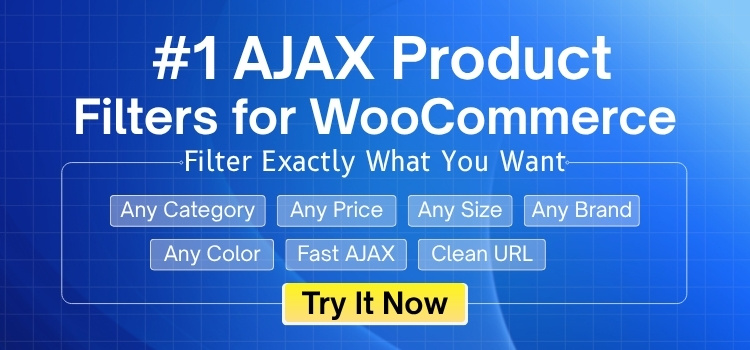Finding the right WooCommerce product filter can make a big difference to how customers browse your store. Product Filter by WBW and Dynamic Ajax Product Filters are two popular choices that promise faster searches, smoother navigation, and more control over how products are displayed. While they share the same core goal, their approaches are not identical.
Both plugins bring AJAX-based filtering, flexible display options, and compatibility with page builders like Elementor and Gutenberg. But when you look beyond the basics, differences begin to stand out. From how quickly results appear to how filters can be placed, styled, and customized, each plugin offers a unique way of improving the shopping experience.
This comparison between product filter by WBW vs. dynamic AJAX product filters takes a closer, critical look at what sets them apart. Product Filter by WBW delivers a broad range of filtering options and built-in analytics, making it a solid all-rounder. Dynamic Ajax Product Filters leans towards a modern interface, instant responsiveness, and flexible placement, giving it an edge for stores that value speed and sleek design. By the end, you’ll have a clear understanding of which plugin matches your store’s needs, your customers’ expectations, and the way you want to present your products.
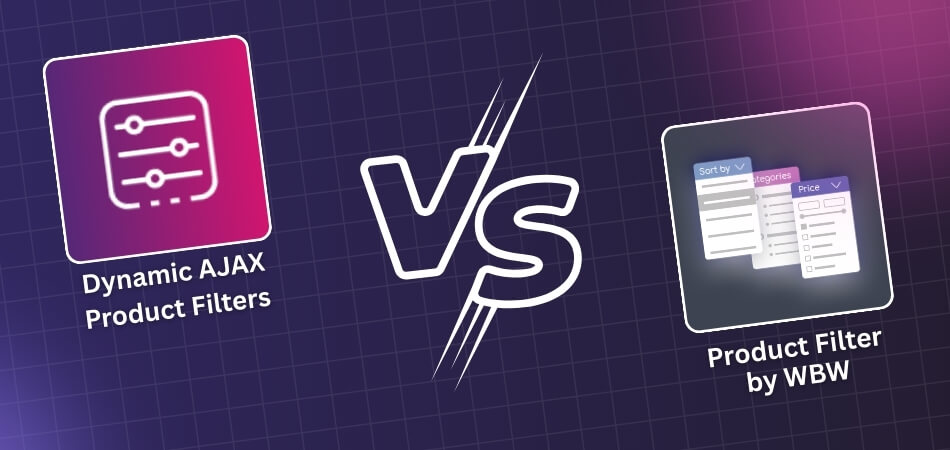
A Quick Overview
Choosing the right WooCommerce filter plugin can greatly impact your store’s usability and sales. Below is a concise comparison of Product Filter by WBW and Dynamic Ajax Product Filters, highlighting their core capabilities so you can quickly spot which aligns best with your store’s needs.
| Core Feature | Product Filter by WBW | Dynamic Ajax Product Filters |
| AJAX Filtering & Sorting | Instant AJAX filtering and sorting. | Real-time AJAX filtering, pagination, sorting. |
| Filter by Price, Rating, Category & Attributes | Price, category, tags, attributes, ratings, more. | Price, category, size, tags, attributes, brand, ratings. |
| Multiple Filtering Methods | AJAX with/without URL updates. | Query string, permalinks, AJAX. |
| Shortcode Compatibility | Filter shortcodes and widgets. | Filter widget, single filter, active filters shortcodes. |
| Page Builder Integration | Elementor & Gutenberg widgets. | Elementor & Block Editor support. |
| Mobile Experience | Responsive with collapsible sections. | Four mobile filter styles. |
| Filter Visibility & Control | Page/device-specific controls. | Global or per-page controls. |
| SEO Features | SEO meta control for filtered pages. | SEO meta control for filtered pages. |
What is Dynamic Ajax Product Filter?
Shoppers love speed and convenience, and a woocommerce ajax product filter plugin like Dynamic AJAX Product Filter delivers exactly that by updating product results instantly as filters are applied, without reloading the page. It supports attributes like color, size, price, and ratings, integrates smoothly with popular page builders, and offers SEO-friendly filtering for a faster, more enjoyable shopping experience.
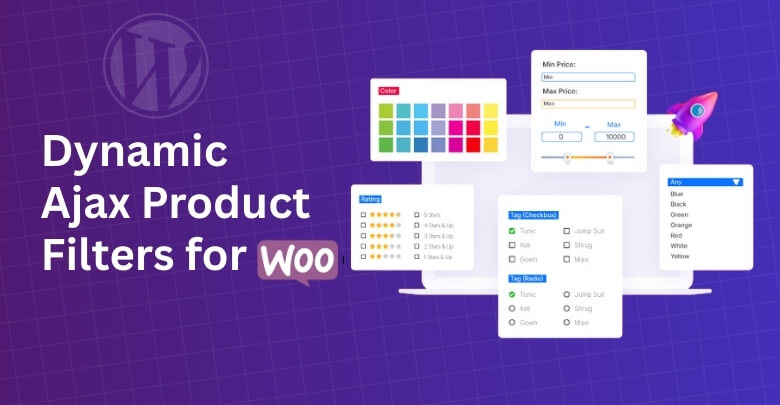
Technical Details
| Type of Plugin | WooCommerce product filtering plugin |
| Developed By | Plugincy |
| Current Version | 1.3.6 |
| Active Installations / Users | 100+ |
| Free / Paid Availability | Free version available, Pro version with advanced features |
Features to Look Out
Dynamic Ajax Product Filters blends speed, flexibility, and intuitive design. Here are the key features that make it a solid choice for WooCommerce stores:
- Real-Time AJAX Filtering: Results update instantly as shoppers toggle filters, sort, or paginate, no page reloads. This keeps users in flow, reduces friction, and speeds product discovery across large catalogs.
- Flexible Filter Options: Filter by price, ratings, categories, tags, and attributes such as color, size, or brand. Flexible combinations let customers pinpoint items that match their exact preferences quickly.
- Multiple Filtering Methods: Choose how filtering behaves: query-string URLs, clean permalinks, or pure AJAX without URL changes. Pick the approach that balances UX, analytics clarity, and SEO requirements for your store.
- Shortcodes & Widgets: Drop filters anywhere using shortcodes and widgets—sidebars, custom templates, or product archives. Active filters and single-attribute shortcodes help create focused, minimal interfaces where needed across pages.
- Built-in Widget & Block (Elementor/Gutenberg): Dedicated Elementor widget and Gutenberg block provide drag-and-drop placement and styling inside your builder, keeping layout control in one place without custom code or theme edits.
- Filter Visibility Control: Decide exactly where filters appear. Show or hide globally, per page, or per template. Tailor visibility for key categories and landing pages to keep interfaces uncluttered and relevant.
- Advanced UI Elements: Present filters as dropdowns, checkboxes, radio buttons, sliders, color or image swatches, button checks, input fields, and star ratings. Select enhanced dropdowns, add search for long option lists.
- Customizable Loaders: Pick from six built-in loading animations or craft your own via HTML and CSS. Subtle loaders provide feedback during updates without distracting from products or slowing perceived performance.
- SEO-Friendly Setup: Control meta titles, descriptions, and keywords for filtered views, and tune URL structures. Clean, descriptive URLs help search engines understand context while keeping analytics and sharing straightforward.
Why Should You Choose Dynamic Ajax Product Filters?
Finding the right product quickly is one of the biggest factors in turning a visitor into a customer. Dynamic Ajax Product Filters is designed to make that process smooth, intuitive, and frustration-free. Here’s why it might be the perfect fit for your WooCommerce store:
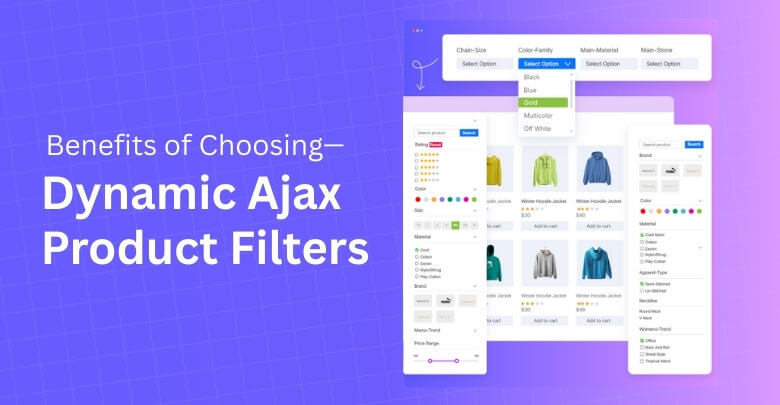
Fast, Seamless Browsing
Results update instantly as customers apply filters, no page reloads, no waiting. This speed keeps shoppers engaged and encourages them to explore more products.
Highly Relevant Filtering
From price and ratings to colors, sizes, and brands, customers can narrow down to exactly what they’re looking for in just a few clicks.
Custom Filters for Different Pages
You can set up unique filters for each product category or page, making them more relevant to the products on display and improving the shopping experience.
Flexible Placement Options
Whether you prefer filters in sidebars, top bars, or custom sections, shortcodes and widgets make it easy to place them where they’ll be most effective.
Built for Any Design Style
With dropdowns, sliders, swatches, and more, filters can be styled to match your store’s design perfectly, all without touching a single line of code.
SEO-Friendly Setup
Control how filters affect URLs, page titles, and meta descriptions to improve search visibility and make filtered pages more shareable.
Optimized for Performance
Lightweight, AJAX-driven filtering means even large catalogs load quickly, reducing frustration for customers and lowering bounce rates.
Pros & Cons at a Glance
Dynamic Ajax Product Filters comes with plenty of strengths that make it a great choice for WooCommerce stores. Here’s a quick snapshot of its upsides and one minor downside.
Pros:
- Fast, reload-free product filtering for a smoother shopping experience.
- Works well with Elementor and the WordPress block editor.
- Offers multiple filtering methods to suit different store needs.
- Flexible placement options using shortcodes and widgets.
- Wide range of filter types, including price, ratings, and attributes.
- SEO controls for better visibility of filtered pages.
Cons:
- Some advanced styling options require extra tweaking
What About the Pricing?
A major highlight of Dynamic Ajax Product Filter is its flexible pricing. Whether you’re running a single store or managing multiple sites, you’ll find a plan that suits both your requirements and budget.
- Yearly Plans
- Lifetime Plans
| Plan Type | Sites Supported | Price | Normal Price | Includes |
| Yearly Plan | 1 Site | $39/year | $49 | All pro features, 1 year support & updates |
| Yearly Plan | Up to 5 Sites | $89/year | $99 | All pro features, 1 year support & updates |
| Yearly Plan | Unlimited Sites | $189/year | $199 | All pro features, 1 year support & updates |
| Lifetime Plan | 1 Site | $79 one-time | $89 | Lifetime access, updates, and support |
| Lifetime Plan | Up to 5 Sites | $139 one-time | $149 | Lifetime access, updates, and support |
| Lifetime Plan | Unlimited Sites | $289 one-time | $299 | Lifetime access, updates, and support |
The value is strong too, every plan includes full premium features. For long-term stores, the lifetime option quickly becomes cost-effective. Developers and agencies will especially appreciate the unlimited lifetime plan, offering one payment, no renewals, and complete access across all projects.
What is Product Filter by WBW?
Product Filter by WBW is a simple yet powerful WooCommerce tool that lets shoppers narrow products by things like price, categories, ratings, and attributes. It blends smoothly into your store design, works beautifully with Elementor, and updates results instantly, helping customers find what they need without extra clicks or page reloads.
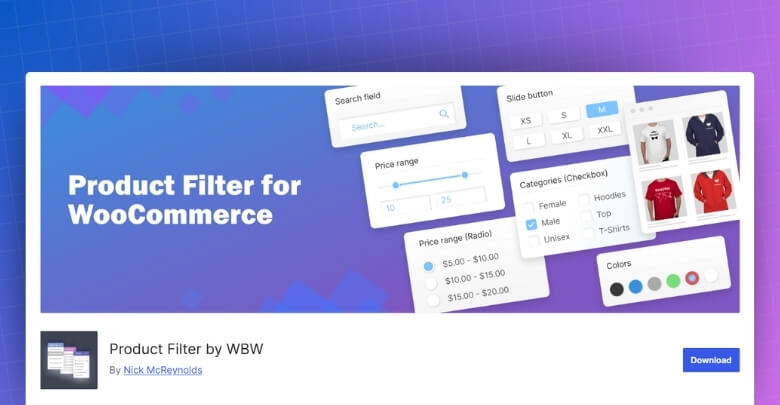
Technical Details
| Type of Plugin | WooCommerce product filtering plugin |
| Developed By | Nick McReynolds |
| Current Version | 2.9.4 |
| Active Installations / Users | 60,000+ |
| Free / Paid Availability | Comes in both free and paid versions |
Features to Look Out
If you want to give shoppers a smooth, stress-free way to find products, Product Filter by WBW comes packed with tools to make it happen. Here’s a closer look at its standout features:
- AJAX Live Search: Updates product results instantly as shoppers apply filters, without reloading the page. This speeds up browsing and keeps customers engaged while they explore your store.
- Wide Range of Filter Options: Supports filtering by price, categories, tags, attributes, ratings, author, featured items, on-sale items, and stock status to help shoppers narrow results quickly.
- Multiple Display Formats: Choose from dropdowns, radio buttons, checkboxes, or icons for attributes like color and size, making filters blend perfectly with your store’s design and branding.
- Elementor & Gutenberg Integration: Comes with dedicated widgets and blocks so you can drag, drop, and style filters directly in your page builder without writing code.
- Customizable Price Sliders: Offers multiple skins and styles for price sliders, plus adjustable step values and currency options for a polished and functional look.
- Filter Usage Statistics: Tracks which filters customers use most, giving you valuable insights to improve store navigation and adjust your product presentation strategy.
- Live Preview in Admin: Lets you see design and setting changes instantly while building filters, saving time and avoiding back-and-forth edits after publishing.
- Different Filters for Different Pages: Assign unique filter sets to specific product categories or pages, keeping filtering relevant and streamlined for each section of your store.
Why Should You Choose Product Filter by WBW?
When your store has a large catalog, helping customers find what they want quickly can make a big difference to your sales. Product Filter by WBW is built to make that search simple, fast, and enjoyable. Here’s why it could be the right choice for your WooCommerce shop:
Instant, Smooth Filtering
With AJAX live search, results refresh immediately without reloading the page. This keeps browsing fluid and lets shoppers see their choices instantly.
Covers Almost Every Filter Need
From price and categories to ratings, tags, attributes, and even stock status, it offers a complete set of filtering tools for different product types.
Custom Filters for Different Pages
You can create unique filter sets for each category or product page, ensuring that customers only see the most relevant options for what they’re browsing.
Seamless Page Builder Integration
Works directly inside Elementor and Gutenberg, letting you place and style filters without touching code, so the design stays consistent with the rest of your store.
In-Depth Filter Analytics
Tracks how customers use filters so you can spot trends, learn what’s important to shoppers, and fine-tune your product display strategy.
Highly Customizable Price Sliders
Offers multiple styles, adjustable steps, and currency controls so you can match the look and feel to your store while keeping it functional.
Built-In SEO Tools
Lets you edit meta titles, descriptions, and keywords for filtered pages, helping search engines index your products more effectively.
Easy to Maintain and Update
Once filters are set up, making changes is quick and straightforward, so you can adapt as your store grows or your product lines change.
What About the Pricing?
Product Filter by WBW offers two main licensing options, Yearly and Lifetime, where each is available for different numbers of sites. The yearly plans are more budget-friendly upfront, while lifetime plans are a one-time payment with ongoing updates and support.
| Plan Type | One Site | Up to Five Sites | Unlimited Sites |
| Yearly | $99 | $199 | $399 |
| Lifetime | $299 | $399 | $599 |
If you only need the plugin for a single site and prefer lower upfront costs, the yearly plan makes sense. However, for long-term use, especially on multiple sites, the lifetime plans offer better value since they remove the need for yearly renewals.
Pros & Cons at a Glance
Product Filter by WBW brings plenty of useful tools to make shopping easier, but like any plugin, it’s not without a few minor drawbacks. Here’s a quick look at both sides.
Pros:
- Offers a wide range of filtering options for different store types.
- Works smoothly with Elementor and Gutenberg page builders.
- AJAX live search provides instant, reload-free results.
- Allows different filters for different pages or categories.
- Built-in analytics to track how customers use filters.
- Highly customizable design, including price slider skins and styles.
Cons:
- Initial setup can take time if you have many categories.
- Some advanced features require the premium version.
- Occasional styling adjustments may be needed for certain themes
Product Filter by WBW vs. Dynamic AJAX Product Filters
Both plugins promise fast, easy product discovery, but they approach it in different ways. Here’s a critical look at how their key features stack up side-by-side, focusing on real usability, flexibility, and store management needs.
Product Filter by WBW vs. Dynamic AJAX Product Filters – Critical Comparison
| Feature | Product Filter by WBW | Dynamic AJAX Product Filters |
| Real-Time Filtering | Updates results fairly quickly but can slow down when handling very large catalogs. | Smoother filtering with better consistency, keeping browsing fast even on big stores. |
| Filter Variety | Offers a wide range of filters, giving flexibility for detailed stores. | Focuses on essential filters with cleaner usability, avoiding unnecessary clutter. |
| Filter Behavior Options | Provides multiple modes but may feel tricky for beginners to configure. | Easier to set up and more straightforward for everyday store owners. |
| Widgets & Shortcodes | Widgets and shortcodes are available but may require small design adjustments. | Seamless integration with builders that reduces the need for styling tweaks. |
| Page Builder Integration | Works well but can sometimes feel less polished with custom themes. | Tighter builder integration ensures smoother layouts and fewer conflicts. |
| Filter Placement Control | Offers good flexibility, but setup can be time-consuming for complex sites. | Provides more intuitive placement options that speed up the setup process. |
| Custom UI Elements | Wide selection of filter styles, though sometimes overwhelming for store admins. | Balanced UI elements that are polished and user-friendly without overcomplicating things. |
| Loading Animations | Comes with functional loaders, though the design feels a bit dated. | Sleeker, customizable loaders that add a modern touch to the shopping flow. |
| SEO Handling | Includes SEO controls but requires extra care for cleaner URLs. | Offers more straightforward SEO management with well-structured URLs. |
| Relevance by Page | Lets you assign different filters, but the process can be tedious at scale. | Simpler to manage across multiple pages, improving relevance more efficiently. |
Real-Time Filtering
WBW updates quickly but can slow on very large catalogs, so stores sometimes delay updates with an Apply button. Dynamic AJAX feels consistently smoother with instant changes, keeping shoppers moving. The edge is usability during rapid filtering, not raw speed alone.
Filter Variety
WBW shines with extras like author, stock status, and sale filters, which suit complex catalogs. Dynamic AJAX sticks to essentials like price, rating, categories, tags, attributes, reducing clutter for shoppers. For most stores, that focused set keeps filtering clearer and faster, which is often the better trade-off.
Filter Behavior Options
Both offer different modes, but WBW’s choices can feel busy for beginners. Dynamic AJAX makes URL and AJAX behavior simpler to configure, so setup time is shorter and mistakes are fewer. The advantage is approachability rather than breadth, which helps small teams ship faster.
Widgets & Shortcodes
WBW includes widgets and shortcodes, though styling sometimes needs extra tweaks. Dynamic AJAX usually drops in with fewer adjustments, especially in mixed layouts. The benefit shows up during build and handoff: less CSS fuss, faster iteration, and a more predictable front-end outcome.
Page Builder Integration
WBW works with Elementor and Gutenberg, yet custom themes may need polish. Dynamic AJAX tends to mesh more neatly with page builders, reducing layout hiccups. The edge is practical: fewer surprises when you revise sections or clone templates under tight timelines.
Filter Placement Control
WBW can place different filters around the site, but complex setups take time to map. Dynamic AJAX’s shortcode-first approach feels more flexible for unusual layouts or landing pages. The win is speed of placement and experimentation, helpful for campaigns and A/B tests.
Custom UI Elements
WBW offers many styles, which are powerful but can overwhelm admin choices. Dynamic AJAX provides polished, modern elements like swatches, ratings, and searchable dropdowns, without overloading settings. The edge is clarity: enough visual options to look refined, without sending editors through endless toggles.
Loading Animations
WBW’s loaders are functional but a bit dated in feel. Dynamic AJAX includes sleeker, customizable loaders that signal progress without visual noise. It’s a small detail, yet the shopping flow feels more contemporary, which can subtly lift perceived speed and brand polish.
SEO Handling
WBW includes metadata controls but requires care to keep URLs tidy when filters stack. Dynamic AJAX offers multiple URL patterns, making it easier to align with your SEO plan. The advantage is operational: simpler, cleaner linking that plays nicely with analytics and sharing.
Relevance by Page
WBW lets you assign different filters per page, though scaling that setup takes patience. Dynamic AJAX makes page-specific filters quicker to roll out, especially across many categories. The edge is efficiency, less configuration fatigue when your catalog grows or seasons change.
Frequently Asked Questions
Before making a decision, many store owners still have a few doubts about how these plugins work in real-world use. Here are some common questions that often come up after exploring both options.
Can I Use These Plugins With a Multi-Vendor Marketplace?
Yes, both plugins work with most multi-vendor setups built on WooCommerce. You might need to adjust filter placement depending on your theme. It’s always best to test on a staging site first.
Do These Filters Work With Custom Product Types?
They can handle custom product types if those products use standard WooCommerce taxonomies or attributes. If you have highly unique product data, some extra setup or mapping may be required. Testing is recommended.
Will Adding Filters Slow Down My Website?
Filters add database queries, but both plugins use AJAX to keep pages responsive. Performance mainly depends on your hosting and catalog size. Using caching and optimized queries helps maintain speed.
Can I Track Which Filters My Customers Use Most?
Product Filter by WBW has built-in statistics to monitor filter usage. Dynamic Ajax Product Filters requires external analytics for similar insights. Tracking can help you refine your filter design over time.
Are These Plugins Suitable for Non-Technical Store Owners?
Yes, both come with clear settings and drag-and-drop options. WBW may feel more beginner-friendly, while Dynamic Ajax offers more styling flexibility. Watching setup videos can make the learning curve smoother.
Concluding Words
Choosing the right product filter can truly improve how customers explore your store. When looking at Product Filter by WBW vs. Dynamic AJAX Product Filters, it’s clear that both plugins offer solid ways to speed up product searches and make filtering easier. Your choice depends on what matters most to your store’s needs.
Product Filter by WBW stands out for its wide range of filtering options and built-in analytics, making it great for stores that want detailed control and insights. On the other hand, Dynamic AJAX Product Filters impresses with its smooth, instant filtering and flexible design options, perfect for stores that value speed and modern looks.
Ultimately, both plugins bring real value to WooCommerce shops. By weighing your priorities, you can pick the one that fits your store best and helps your customers find what they want with ease.
